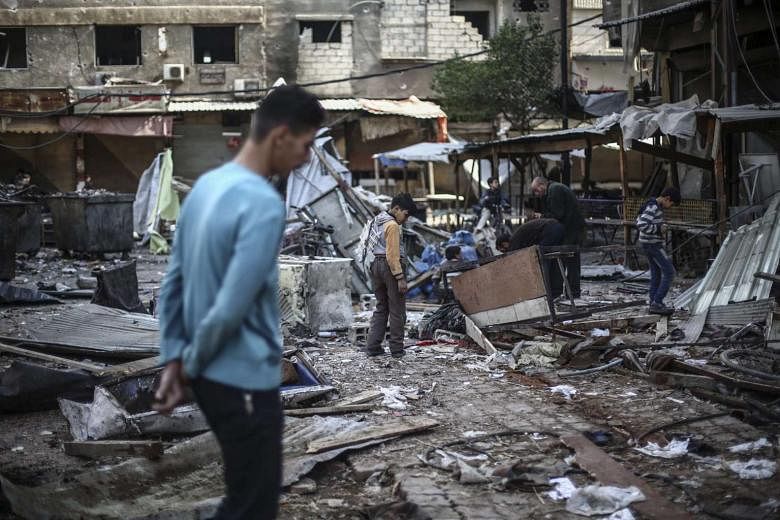VIENNA (AFP) - The United States announced on Friday (Oct 30) its first sustained deployment of ground troops to Syria to help the anti-jihadist fight, as major powers remained divided over President Bashar al-Assad's fate.
The decision to send a small special forces team marks an escalation in Washington's efforts to defeat the Islamic State (IS) group, which has seized more Syrian territory despite more than a year of US-led air strikes.
The White House rejected accusations that President Barack Obama was backtracking on a promise not to put boots on the ground.
"Our strategy in Syria hasn't changed," spokesman Josh Earnest said. "These forces do not have a combat mission."
Officials said an initial deployment of "fewer than 50" special forces would be sent to northern Syria - parts of which are controlled by Syrian Kurdish forces fighting IS. Washington will also deploy A-10 ground-attack planes and F-15 tactical fighter jets to the Incirlik base in southern Turkey, as part of the ramped up effort.
The announcement came as key backers of Syria's rival sides meeting in Vienna sought to narrow their divisions over a conflict that has claimed a quarter of a million lives and triggered an exodus of refugees to Europe.
'AGREE TO DISAGREE'
Syrian regime allies Russia and Iran are resisting Western and Saudi pressure to force Assad from power.
US Secretary of State John Kerry said he had "agreed to disagree" with his Iranian and Russian counterparts on the fate of the Syrian leader. Kerry said Washington still believes Assad leaving office would smooth the path to a deal to end Syria's war and help to defeat IS.
Russia's Foreign Minister Sergei Lavrov and Iran's Mohammad Javad Zarif disagreed, he admitted, but all three would continue to work together to pursue a political settlement. He said the participants had agreed to ask the United Nations to broker a ceasefire.
Kerry and Lavrov also said they had agreed that Syria must emerge from war as a unified secular state.
Top diplomats from 17 countries, as well as the United Nations and the European Union, gathered in Vienna for the talks bringing together all the main outside players in the four-year-old crisis for the first time. The Syrian regime and the opposition were not represented.
MORE TALKS AHEAD
Participants found common ground in some areas although they remained divided over Assad's future, French Foreign Minister Laurent Fabius said.
"There are points of disagreement, but we advanced enough for us to meet again, in the same configuration, in two weeks," he told reporters.
"The main disagreement is the future role of Mr. Bashar al-Assad," Fabius added.
Saudi Foreign Minister Adel al-Jubeir - whose kingdom supports anti-regime rebels - was sat almost as far from his Iranian counterpart as was possible at the tight U-shaped table in a conference room of Vienna's Imperial Hotel.
Yet even getting Iran and Saudi Arabia - the Middle East's foremost Shiite and Sunni powers which back opposing sides in conflicts across the Arab world - to be in the same room was seen as progress.
Russia and Saudi Arabia also exchanged a list of Syrian opposition groups with which they have contact, Russian deputy foreign minister Mikhail Bogdanov said, quoted by RIA Novosti state news agency.
As the participants met, at least 89 people, including 17 children, were killed on Friday in attacks on opposition strongholds in the north and outside Damascus, the Syrian Observatory for Human Rights said.
Most died when more than a dozen rockets fired by government forces crashed into Douma, a town on the eastern edges of the capital, the Britain-based monitoring group said.
Russia, which has waged a month of intense air strikes against Assad's armed opponents, has urged preparations for parliamentary and presidential elections in Syria.
But the idea has been rejected by rebels who say a vote would be impossible in the current circumstances, with millions of Syrians displaced, cities standing in ruins and two-thirds of the country in the hands of jihadists and other armed groups.
Underscoring the perils facing those fleeing the war, 26 migrants, including at least 17 children, drowned during the night making the perilous journey from Turkey to Greece as they made a desperate bid to reach Europe.
The West has accused Russia of concentrating its air campaign in Syria on moderate opposition groups opposed to Assad's rule, although Moscow says it is focusing on defeating IS and other "terrorist" organisations. Russia said Friday its airforce had hit 1,623 "terrorist targets" in Syria over the past month, including 51 training camps.


